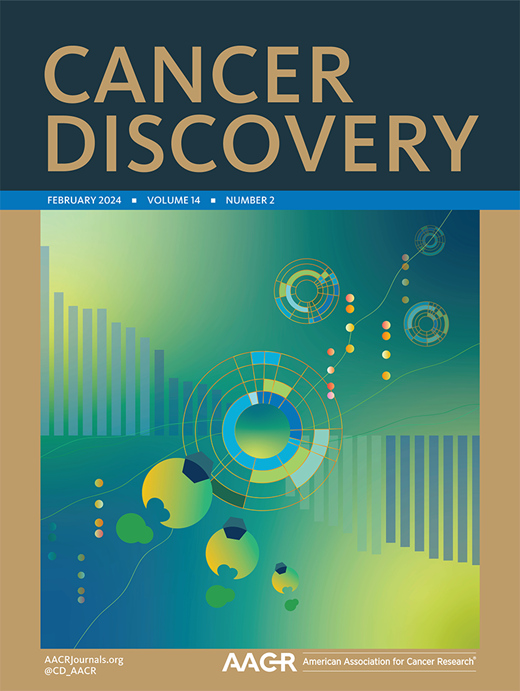Functional mapping of epigenomic regulators uncovers coordinated tumor suppression by the HBO1 and MLL1 complexes
IF 33.3
1区 医学
Q1 ONCOLOGY
引用次数: 0
Abstract
Epigenomic dysregulation is widespread in cancer. However, the specific epigenomic regulators and the processes they control to drive cancer phenotypes are poorly understood. We employed a novel high-throughput in vivo method to perform iterative functional screens of >250 epigenomic regulators within autochthonous oncogenic KRAS-driven lung tumors. We identified many previously unappreciated epigenomic tumor-suppressor and tumor-dependency genes. We show that a specific HBO1 complex and MLL1 complex are robust tumor suppressors in lung adenocarcinoma. Histone modifications generated by HBO1 complex are frequently reduced in human lung adenocarcinomas and are associated with worse clinical features. HBO1 and MLL1 complexes co-occupy shared genomic regions, impact chromatin accessibility, and control the expression of canonical tumor suppressor genes and lineage fidelity. The HBO1 complex is epistatic with the MLL1 complex and other tumor suppressor genes in lung adenocarcinoma development. Collectively, these results provide a phenotypic roadmap of epigenomic regulators in lung tumorigenesis in vivo.表观基因组调控因子的功能定位揭示了HBO1和MLL1复合物协同抑制肿瘤
表观基因组失调在癌症中普遍存在。然而,特定的表观基因组调控因子和它们控制的驱动癌症表型的过程却知之甚少。我们采用了一种新颖的高通量体内方法来进行&;gt;原位致癌kras驱动肺肿瘤中的250个表观基因组调控因子。我们发现了许多以前未被发现的表观基因组肿瘤抑制基因和肿瘤依赖基因。我们发现一个特定的HBO1复合体和MLL1复合体在肺腺癌中是强有力的肿瘤抑制因子。HBO1复合体产生的组蛋白修饰在人肺腺癌中经常减少,并与较差的临床特征相关。HBO1和MLL1复合物共同占据共享的基因组区域,影响染色质可及性,并控制典型肿瘤抑制基因的表达和谱系保真度。在肺腺癌的发展过程中,HBO1复合体与MLL1复合体和其他肿瘤抑制基因是上位性的。总的来说,这些结果提供了体内肺肿瘤发生中表观基因组调控因子的表型路线图。
本文章由计算机程序翻译,如有差异,请以英文原文为准。
求助全文
约1分钟内获得全文
求助全文
来源期刊

Cancer discovery
ONCOLOGY-
CiteScore
22.90
自引率
1.40%
发文量
838
审稿时长
6-12 weeks
期刊介绍:
Cancer Discovery publishes high-impact, peer-reviewed articles detailing significant advances in both research and clinical trials. Serving as a premier cancer information resource, the journal also features Review Articles, Perspectives, Commentaries, News stories, and Research Watch summaries to keep readers abreast of the latest findings in the field. Covering a wide range of topics, from laboratory research to clinical trials and epidemiologic studies, Cancer Discovery spans the entire spectrum of cancer research and medicine.
 求助内容:
求助内容: 应助结果提醒方式:
应助结果提醒方式:


